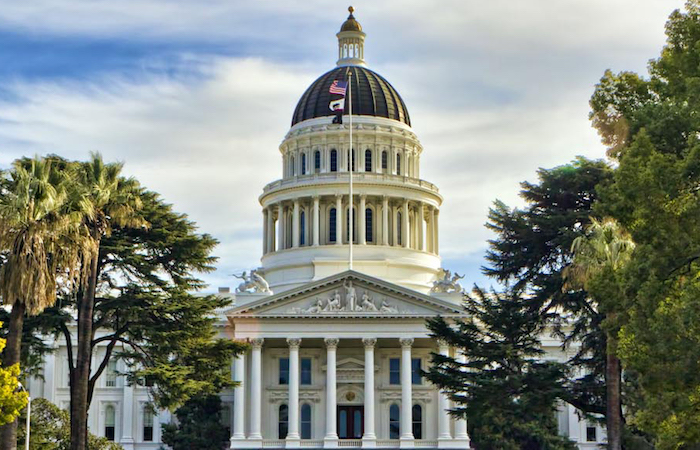CBPA's California Legislative Update 2/22/19

- INDOOR HEAT ILLNESS REGULATIONS
- CLIMATE CHANGE DRIVES MAJOR CEQA GUIDELINE CHANGES
- NEWSOM CONTINUES AGGRESSIVE APPROACH WITH LOCALS ON HOUSING
- 2020 SPLIT ROLL MEASURE MUST BE DEFEATED
- MORE GROUPS SUPPORT HIME FOR SENATE
- CBPA 2019 CALENDAR
INDOOR HEAT ILLNESS REGULATIONS
Our industry has submitted comments on new regulations the state is drafting regarding Indoor Heat Illness.
In 2005, California became the first state—and still the only state in the nation—to adopt a heat illness prevention standard to protect outdoor workers (California Code of Regulations, Title 8, Section 3395). The outdoor heat illness prevention standard requires employers to provide outdoor workers with water, shade, rest breaks, and training. Known as the high heat provisions, additional requirements apply when the outdoor temperature exceeds 95 degrees.
In 2016, CalChamber and a large coalition of businesses opposed SB 1167, which sought to establish a regulation to prevent heat illness for indoor workers. The coalition maintained that a specific regulation is unnecessary because current regulations (Title 8, Section 3203 Illness and Injury Prevention Program) require employers to identify and address workplace hazards, including the risk of heat illness in indoor workplaces.
In 2017, Cal/OSHA convened two stakeholder advisory committees to tackle the challenge of reaching consensus among interested parties from industry, labor, management and academia on how to regulate the prevention of heat illness for indoor workers. To date, Cal/OSHA has provided draft rules and a formal rulemaking has begun. These draft rules propose to regulate all indoor workplaces for these purposes.
Believe it or not, defining an indoor workplace, as opposed to an outdoor workplace, has proven to be challenging, including determining when vehicles and equipment are indoor or outdoor. Many employers have both outdoor and indoor workplaces, with some or all employees transitioning between both.
These questions of scope require industry input to provide Cal/OSHA the most rational and complete understanding of operations and risks, as well as rational, feasible policies to address those identified risks.
We are partnered with the CalChamber and have submitted a fourth set of comments on a fourth draft of the Cal/OSHA proposed draft indoor heat illness rule as it will ultimately have an impact on you.
Click here for more information from the CalChamber about the large coalition of employers that are working together to make sure these rules can be implemented in a way that makes sense and minimizes unnecessary costs.
CLIMATE CHANGE DRIVES MAJOR CEQA GUIDELINE CHANGES
Law firm Beveridge and Diamond have put together an article describing some of the recent CEQA Guideline changes. We have kept you in the loop as these proposals were being considered over the past two years by the previous administration.
A large coalition of groups including CBPA and CBIA have been working for several years to try to make these new regulations as palatable as possible but have received a lot of push back from the previous administration and environmental advocates.
If you deal with CEQA this is an extremely important issue that now requires lead agencies to adopt the Vehicle Miles Traveled (VMT) methodology for evaluating transportation projects by July.
Click here for more information.
Previously we have shared the update provided by our friends at Allen Matkins, click here to read it.
NEWSOM CONTINUES AGGRESSIVE APPROACH WITH LOCALS ON HOUSING
Earlier this week Governor Gavin Newsom highlighted how the state is partnering with California cities and counties to address the state’s housing cost crisis. In his State of the State address, Governor Newsom called on cities and counties across the state to do their part to address California’s housing crisis.
Governor Newsom highlighted the $1.7 billion in major assistance and incentives that his budget would provide to municipalities that plan and zone for housing production and offered assistance to cities whose housing plans are currently in violation of California housing law — all while acknowledging that cities whose plans remain out of compliance will be held to account.
This week he met with Long Beach Mayor Robert Garcia and toured an affordable housing development to highlight the city as one hat is working hard to address housing needs in the region. The site, a 27-acre supportive housing community that provides temporary, transitional and permanent affordable housing for veterans, families, youth and children, serves more than 1,000 individuals on any given day.
By highlighting cities that are building affordable housing and going after those that are not through lawsuits and threats to withhold state transportation funding, Newsom is doing more to highlight the housing crisis at a high level than anyone in recent memory.
We hope that the Governor will tackle core impediments to delivering housing in this state – high costs of building due to CEQA, labor costs, and unwarranted NIMBY lawsuits – but want to congratulate him for taking these beginning steps to address the issue. Click here for more information.
2020 SPLIT ROLL MEASURE MUST BE DEFEATED
(Note: we are re-running this story because its importance cannot be overstated.)
Rex S. Hime, President & CEO California Business Properties Association, has penned the following op/ed regarding the ongoing battle to protect Proposition 13. You are highly encouraged to share this article and/or run it in your own publications:
Proposition 13 has been protecting taxpayers in California since 1978. This measure created by Howard Jarvis is one of the only protections that you have against unimpeded increased in your property taxes – and now it is under serious threat.
Californians are some of the most heavily tax-burdened in the country. Now, special interests want to raise taxes by another $11 billion through this measure, despite record-high revenue, record-high per-pupil spending and $17 billion in budget reserves. A split roll property tax increase isn’t needed and will just make it more difficult to do business in California.
For years public employee unions and far-left wing advocacy groups have wanted to dismantle Proposition 13 in hopes of increasing your taxes to increase revenue for their members and pet spending projects. Those groups have gathered enough signatures to place a measure on the ballot in November 2020.
One of the ONLY protections property owners in this state has is under serious threat and for thirty years – and now -- I remain one of the primary people standing to fight back against this outrageous tax increase.
Under the 2020 proposal, Prop. 13 will be undone by mandating that all non-residential properties be reassessed to 2020 values and be reassessed every three years thereafter. Commercial property will lose certainty about future tax liabilities and one can only imagine the impact and cost to long time property owners that will see massive adjustments.
The proponents of this effort have stated that dismantling Prop 13 will result in an $11 billion tax increase on California’s property owners and employers.
Aside from the direct impact on properties, the State’s own Legislative Analyst’s office has warned that the proposal will introduce volatility into the state’s funding stream that puts everything from school funding to support and health programs for the elderly at risk.
Property taxes have been a reliably predictable revenue source for the state since prop 13 passed which allows for some predictability in budgeting and a reliable revenue stream. The greediness of those that want to transfer property tax revenue to their own pockets threatens a system that has worked for more than 40 years!
As one of the longest standing taxpayer advocates in the state, I am coordinating an effort by taxpayer advocates and business groups alike to implement a statewide strategy and defeat this measure. The campaign will be very costly and will take the efforts of many, but the costs of this tax are much greater. Split roll inflicts a mortal wound on Prop 13 protections for all property owners and must be stopped.
Rex S. Hime has been protecting CA taxpayers his entire career. He has served as the President & CEO of California Business Properties Association for 35 years.
MORE GROUPS SUPPORT HIME FOR SENATE
The California Republican Veterans Association today announced their endorsement of Rex Hime for State Senate. Chair Chuck McDougald said, "Rex Hime served his nation honorably. His time in the US Army and National Guard gave him the background and traits that we want in a leader. Residents of Senate District 1 would be greatly served with Rex as their representative."
Rex S. Hime who has been the primary force in California advocating on behalf of California taxpayers who own commercial, industrial, and/or retail private property for over 35 years in his role as President and CEO of California Business Properties Association has answered the call of public service and filed paperwork to fill the seat of the district he has lived in for decades.
Rex has long talked about the importance of people from within the commercial real estate industry stepping-up and getting involved in elective politics. He is putting those words into action.
Former-Governor Pete Wilson, and the Founder and President of the National Tax Limitation Committee Lew Uhler, are serving as Rex’s Campaign Chairs. Rex has also quickly garnered many endorsements including two former Senators who previously held the seat, Senator Tim Leslie (ret.) and current Congressmember John Doolittle.
Senate District 1 is a massive district stretching all the way from the Eastern part of Sacramento County, to Lake Tahoe, then all the way up to the Oregon border stretching to the middle of the State and back down. The district is known as one of the most conservative areas of the state.
Many groups including real estate and veterans groups are lining up to support Rex.
For more information about Rex’s run for California Senate District 1 click here.
GO REX GO!
CBPA 2019 CALENDAR
February 27, 2019
CBPA Winter Board Meeting & New Legislators Luncheon
CalChamber, Sacramento
March 28, 2019
CBPA Industrywide Leg Meeting
June 11 – 12, 2019
California Commercial Real Estate Summit
Sacramento
December 5 – 6, 2019
Strategic Issues Conference
Napa Valley








































